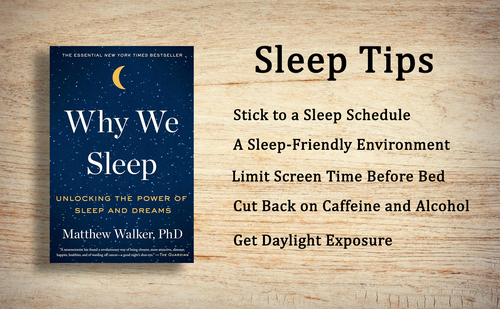How to get better sleep | Why We Sleep: Unlocking the Power of Sleep and Dreams

- Chris
- Oct. 25, 2024
Why We Sleep
by Matthew Walker is one of those books that can truly change the way you think about something as simple as sleep. It’s not just a scientific breakdown of why we need sleep (though it has plenty of that); it’s also packed with practical advice on how to improve the quality of your sleep. Whether you’re struggling with insomnia, feeling tired all the time, or just curious about how to sleep better, this book has answers for you.
Why We Need to Sleep Better
In today’s busy world, sleep often gets pushed to the backburner. We stay up late scrolling through our phones, answering emails, or watching TV, and we don’t realize how much our bodies and minds need rest. Matthew Walker makes it clear: sleep isn’t optional. It’s a necessity for our physical health, mental well-being, and overall quality of life. Without enough good sleep, everything from our memory and focus to our mood and even heart health can suffer.
But the great news is that there are real, actionable steps you can take to fix your sleep, and Chapters 13 and 14 of the book are packed with tips on how to do just that.
What’s Hurting Our Sleep?
In Chapter 13, Walker dives into the things that are messing with our sleep the most. One of the big culprits? Technology. Almost everyone is guilty of checking their phone or watching TV before bed, but this is a bad habit for sleep. The blue light from screens tricks our brains into thinking it’s still daytime, which messes up the release of melatonin—the hormone that helps us fall asleep. Walker suggests turning off devices at least an hour before bed to let your body wind down naturally.
Another thing that gets in the way of sleep is alcohol and caffeine. While a nightcap (a drink before bed) might make you feel sleepy at first, alcohol disrupts your sleep later in the night, especially during REM sleep—the part of sleep that’s critical for dreaming and emotional processing. Caffeine, on the other hand, can stay in your system for hours, making it harder to fall asleep, even if you don’t feel jittery. So, cutting back on both of these, especially before bed, is key to better sleep.
Simple Tips for Better Sleep
In Chapter 14, Walker gives some really helpful and easy-to-follow advice on how to improve your sleep. Here are some of the best tips:
- Stick to a regular sleep schedule: Go to bed and wake up at the same time every day, even on weekends. Your body has an internal clock, and keeping it on a regular schedule will help you fall asleep faster and sleep more soundly.
- Create a sleep-friendly environment: Keep your bedroom cool, dark, and quiet. Walker recommends a temperature around 65°F (18°C). Also, consider blackout curtains to block out light and use earplugs or a white noise machine to cancel out noise.
- Limit screen time before bed: As mentioned earlier, try to avoid using phones, tablets, or laptops right before bed. If you need to use them, turn on the “night mode” to reduce blue light, or wear blue-light-blocking glasses.
- Be mindful of your evening routine: Having a relaxing routine before bed, like reading a book, taking a warm bath, or practicing meditation, can signal to your brain that it’s time to wind down. Stress and anxiety are big sleep disrupters, so learning to relax before bed is important.
- Get natural sunlight during the day: Walker explains that natural light exposure during the day helps set your body’s sleep-wake cycle (your circadian rhythm). Try to get outside in the morning or at least sit by a window for some sunlight during the day.
Sleep is Not a Luxury—It’s a Necessity
Walker’s message is clear: we need to stop thinking of sleep as something that can be sacrificed. In today’s world, it’s easy to think that sleeping less means we’re working harder or achieving more. But in reality, cutting back on sleep hurts our productivity, our health, and even our happiness.
The changes Walker recommends aren’t difficult—they’re simple, everyday adjustments that can make a big difference. Whether it’s dimming the lights at night, avoiding that late-night cup of coffee, or sticking to a consistent bedtime, these small steps can lead to much better sleep.
Final Thoughts
If you’re tired of feeling tired or if you just want to understand how to get better, deeper sleep, Why We Sleep is a must-read. Matthew Walker explains the science behind sleep in a way that’s easy to understand and provides actionable tips to improve your sleep right away. Sleep impacts everything—your memory, your focus, your mood, and even your long-term health—so it’s worth taking the time to get it right.
Pick up this book, and you’ll not only learn why sleep is so important, but you’ll also walk away with practical tools to help you sleep better and feel better every day.

